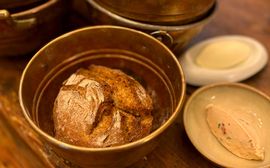Tradition meets modernity: The Hofbräuhaus art mill in Munich

Mr. Blum, thank you very much for your time. What does it mean to you to carry on the centuries-old tradition of the Hofbräuhaus-Kunstmühle?
The main driving force for me and for all of us is the continuation of the long-standing family tradition - after all, the Hofbräuhaus-Kunstmühle has been in the hands of the Blum family for more than 100 years. What drives us is the joy of the product, of the craft and of having something tangible in our hands at the end of the day.
What makes your artisan flour so special?
We deliberately work without any additives, as was customary back in 1921 when Jakob Blum took over the mill. Our coarse-grained flour can absorb more water than the smooth flour produced by today's large mills. Of course, our flour can vary slightly from harvest year to harvest year due to the nature of the raw material, i.e. the grain. The processing requires careful work and knowledge, but the reward is a more intense bread taste and a longer shelf life.
How do you also implement the topic of sustainability in your company?
Production in the center of a large city has its own challenges. We source our grain from the region around Munich and only deliver to customers within a radius of 100 kilometers using our own vehicles. Although natural water power is no longer available due to the construction of the subway, we still work with transmissions and mechanical conveyors, which means we only need a fraction of the energy of a typical “modern” large mill. In our bakery, too, we produce everything fresh every day, as we did in the 1960s, without proofing delays or frozen doughs. This not only saves energy, but also allows us to do without modern aids.
How do you select your raw materials?
We have long-standing relationships with our farmers and suppliers. The choice of variety is discussed together in advance, whereby quality and suitability for the respective soil are decisive. We test the qualities in our laboratory both before and after delivery. One advantage of this regional sourcing and long-standing relationship is that we have had no difficulties in obtaining the raw material to date, even during major global crises.
What challenges do you face in artisanal flour production, especially when processing grains from regional and sustainable cultivation?
We cannot meet all the technical requirements that large, high-tech processors in particular have. There is therefore a market segment that we do not serve, e.g. large bakeries. We focus on artisan bakeries and upmarket restaurants. These customers really appreciate the benefits of our sustainable and artisan flour.
What is the biggest advantage of your flour for catering businesses?
From a purely practical point of view, doughs made from our flours can be processed over a longer period of time. If you take into account the fact that they stiffen, you can achieve better results with artisan processing. In short: baked goods made from our flour taste better and are more digestible. Furthermore, regionality and sustainability are also becoming increasingly important in the food service industry. The Platzl establishments are the best example - the philosophies of the two traditional companies simply go well together.
The Churfürstlaiberl is a special product in your range and it has quickly become a crowd favorite at the Pfistermühle too. Can you tell us something about the creation of this bread and its special features?
The Churfürstlaiberl is a spiced version of our Munich brown bread. We developed it for the Pfistermühle restaurant as a palm-sized loaf that can be enjoyed on its own or in combinations. The name is a tribute to Churfürst Max Emanuel, who founded our company. Like many of our products, the recipe is based on a treasure trove of old books, from which we have also taken other traditional baked goods such as Mundsemmel and Münchner Biergebäck.
Last question: You are preparing for a generational change. What are your plans for the future?
We are planning a smooth transition in which we pass on the tried and tested while remaining open to new ideas and products. As this process is supported by an entire team, many new ideas will emerge. We have a number of product extensions in the pipeline, but quality is always our top priority.
